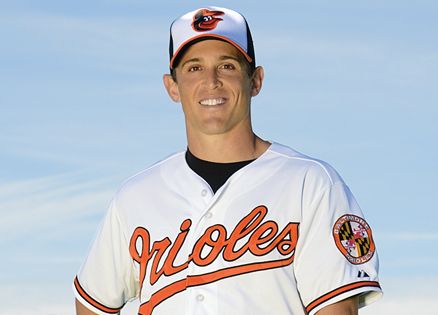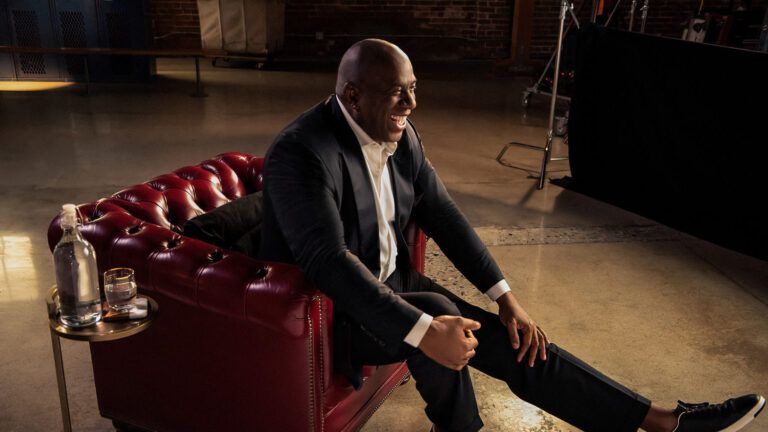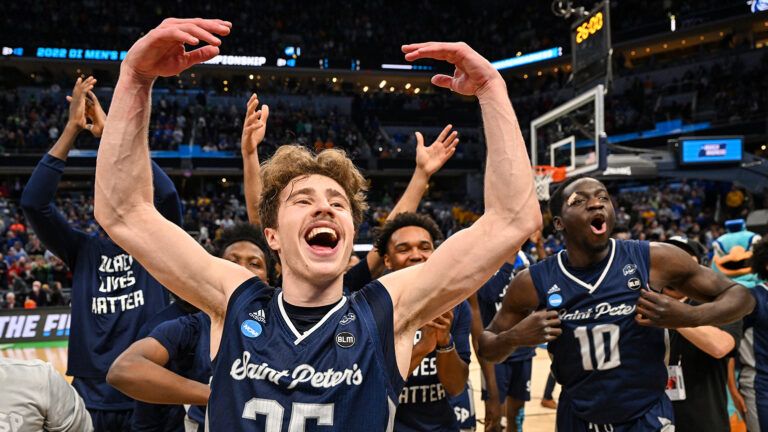Deep breath, I told myself. You have a job to do. I’d played thousands of baseball games in my life, but never one like this. Never one in the major leagues.
I’d worked harder than anyone could imagine, spent years battling to beat the odds that I’d get this far, and now I was about to achieve my boyhood dream. I was a five-feet-nine, 180-pound guy in a six-feet-two, 210-pound world. But on this July 2005 night, I’d made it.
I glanced down at my blue jersey with the Chicago Cubs “C” in red on the front. Soak it all in, I thought, as I emerged from the visitors’ dugout in Marlins Stadium, where my Cubs were playing Florida. This is just the beginning.
Somewhere in the stands, my parents were watching. I pushed the thought of them aside, and studied the pitcher. A big left-hander named Valerio de los Santos. I had never seen him before.
I bat lefty, and I figured like most left-handed pitchers, he’d start me with a fastball, probably on the outer half of the plate. My last thought as I dug in in the batter’s box was Be aggressive.
And then de los Santos wound and fired, the very first big-league pitch I ever saw. A 92-mile-an-hour missile, a fastball, a high heater…or was it? Standing 60 feet, 6 inches away, I had less than a second to decide what the pitch would do. It was barreling straight at my head.
Is it going to hook over the plate at the last instant? I wondered. Or is this a wild pitch?
The pitch bored in on me. It’s not hooking, I realized. I tried to spin out of the way. Too late. The ball smashed into my head with a sickening sound. I crumpled to the ground.
I thought my head had exploded. I cupped it with both hands, afraid it would break into pieces if I let go. My eyes rolled back. Stay alive! Stay alive!
It would have been so simple to close my eyes and let go. But it wasn’t just my life I was battling for. After all those years of struggle to make it to the top, the ballplayer in me wasn’t about to say goodbye to my career after a single pitch.
I looked up. The team trainer leaned over me, firing questions to test my cognition. “Where were you two days ago?” he asked loudly.
“I was in the minors,” I said, groaning, “and I’m not going back.”
Seven years ago, people in sports weren’t as aware of the danger of concussions as they are today. The team doctor examined me in the locker room (I have almost no memory of being helped off the field). I didn’t feel very well, but nothing was broken. “Just rest,” he advised.
Then my parents walked in. “Adam, are you okay?” my mother asked, rushing to my side. By then I was more embarrassed than anything.
“I’m fine,” I assured her. I figured I’d be playing again in a day or two. Back at the plate collecting my first major-league hit and giving the ball to my folks.
It was the last game I would play while healthy for two years.
For the longest time, I couldn’t understand what was going on with my body. No one could.
The morning after the beaning, I woke and walked outside. The light made me nauseous. A few days later I tried to go jogging, and my eyes felt disconnected from my head, as if they were just floating in there somewhere. Several days after that, I bent to put my shoes on and fell over. My season was over.
Years passed, and I never got fully better. My game fell apart. Many of my friends wondered why I just didn’t give up playing.
How can I explain it to you? I thought. You start out in life with a dream, you dedicate your life to that dream, and it’s almost impossible to let go of it without a fight.
Nights after a bad game, I’d sit alone in a motel room on the road and think of all I’d sacrificed to play ball. All the thousands of pushups in my bedroom, so that coaches would notice my strength, not my diminutive frame. The high school parties I skipped, so I could get in another couple of hours of training.
The family vacations where Mom would say, “Come on, kids, let’s take a walk along the beach,” and I’d make some excuse, so I could return to our hotel room and practice swinging my bat in front of the mirror—the bat I’d snuck into our luggage.
For seven years, while my friends were establishing their careers, getting on with their lives, I just couldn’t let go of baseball. I bounced around the minor leagues, going from the Cubs system to the Los Angeles Dodgers to the Kansas City Royals to the Los Angeles Angels and finally out of organized baseball entirely.
Even then, I couldn’t bring myself to quit. I signed on to play with the Bridgeport Bluefish, an independent-league team with no connection to a big-league club. It was the lowest rung in professional baseball.
Some days it seemed like the only person who wanted me to stay on the field was Lindsay, my wife. Lindsay was the one great thing that happened to me in those lost years. One night at home I sat her down. “Tell me what to do,” I said.
She looked at me with searching eyes. “Honey, you love baseball so much, and I love seeing you do something you love,” she said.
I hugged her hard. But deep inside, I wondered if she could ever really bring herself to tell me the truth: The beaning had derailed my career.
One midwinter morning in 2011 I traveled to Sacramento, California, to visit Dusty Baker—my manager the day I stepped to the plate for the Cubs, and now manager of the Cincinnati Reds.
Once, when I was at my lowest, ricocheting around the minors, Dusty had left me a phone message. “Hey, this is Dusty Baker,” the voice said. “Just letting you know I’m thinking about you and that God has a plan for you. Keep believing. Don’t ever give up.”
Now I needed his advice again. Dusty is the most honest man I know, I thought, as I drove north on the freeway. He’ll tell it to me straight.
“How are you, Greeny?” Dusty greeted me like a son. We spent the afternoon in his man cave, catching up. That evening, he took me out to dinner. Over coffee, I turned to him. “Do you think I should sign on for another year in independent-league ball?”
“Listen,” he said, “you can’t go back there. You need to start your life. Your life is more valuable than this game. You can take yourself to the next level.”
Then it struck me: A few years earlier, when Dusty spoke of God’s plan, he wasn’t talking about baseball.
I let go of baseball that day. I went home and told Lindsay, “I’m not playing ball this year.”
I started a nutritional-supplement business, and went all in on it, with all the energy I’d had for the game. “I’m with you, honey,” Lindsay said. That was all I needed. I was at peace.
Isn’t it funny? Once I let go of baseball, baseball decided it wasn’t quite ready to let go of me. An opportunity arose to play on the Israeli national team. And then this crazy Cubs fan began a national campaign to get me one more major-league at bat.
One night at 11:30, I got a phone call from David Samson, the president of the Miami Marlins.
“I was there when you came to bat for the Cubs seven years ago,” he told me. “And I’ve been following your career. So many fans believe you deserve a major-league at bat, after all you’ve been through. On behalf of the Marlins, I would like to extend you a one-day contract to play for us.”
You’re back where you started. That’s what I told myself as I stepped to the plate in Miami last October, leading off the sixth inning of an otherwise inconsequential game between the Marlins—my Marlins—and the New York Mets.
I tugged on my batting helmet. You’ve done this before. No need to be nervous. Get a good pitch to hit. The same advice I’d given myself seven years earlier.
The Mets’ pitcher was R. A. Dickey, who would go on to win the Cy Young Award as the best pitcher in the league. I took a deep breath. The crowd rose to its feet. Chills ran down my spine. I wasn’t expecting that, I thought. I stepped away from the plate, both to calm myself and to savor the moment. Just like before.
I dug in in the batter’s box. Dickey let go his first pitch. It was a knuckleball, far slower than the fastball de los Santos had fired. It looked great to hit—and then dropped three feet just as it arrived at home plate. Strike one.
A minute later it was strike two, then strike three. I had fanned on three pitches.
Seven years, and all I can manage is a strikeout? I thought.
I lowered my head, and turned toward the dugout. Then I heard the cheers. All the Marlins players were up on their feet, applauding. I raised my eyes to the stands. The crowd was giving me a standing ovation. Seven years and you never gave up, they all seemed to be saying.
Not till the night was over, after I’d sat for interviews, hugged my new teammates goodbye and said goodnight to my family, did I think of Dusty again. God’s plan. Maybe I was put here as an example to others.
Maybe God wanted to reinspire me as well. Several months ago the Baltimore Orioles called. They signed me to a minor-league deal. By the time you read this, I’ll be starting a new season, back on the field, following the plan that’s been laid out for me.
Read and watch more inspiring baseball stories!
Download your FREE ebook, Rediscover the Power of Positive Thinking, with Norman Vincent Peale.





